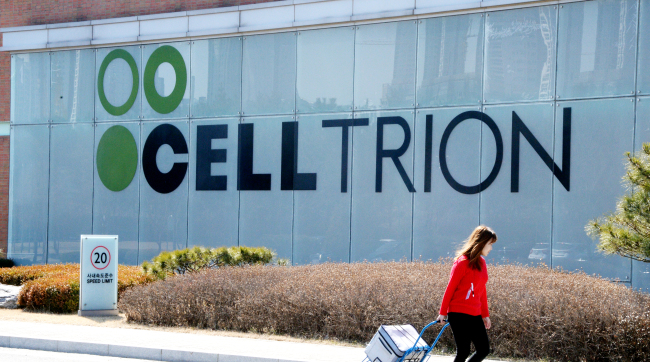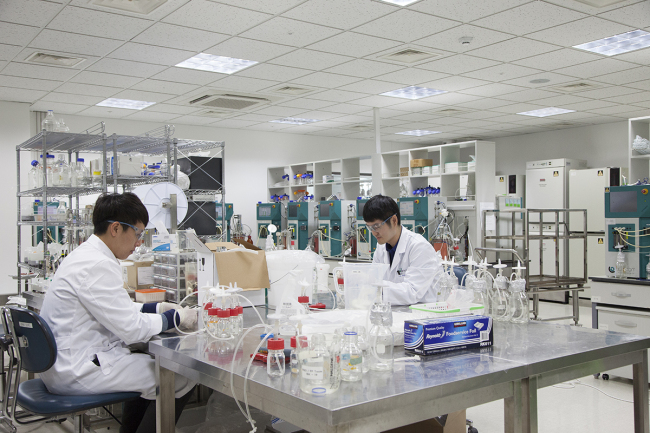[From the Scene] Celltrion bulks up to meet spiraling demand for biosimilars
By Korea HeraldPublished : April 19, 2017 - 16:40
SONGDO, Incheon -- Outside, it was a lazy spring day. The weather in Songdo was warm despite the nearby ocean that usually drags the temperature a few degrees lower than in Seoul.
However, inside the plants of Celltrion, there was a constant buzz as machines ran on full capacity to churn out biosimilars worth 1.4 million injections. Biosimilars are at the heart of the recent success that has followed Celltrion, a local biotech company that rose to fame with Remsima -- known as Inflectra in the US -- which is a cheaper version of Johnson & Johnson’s Remicade. It’s used to treat arthritis and Crohn’s disease, among others. Remsima is also the world’s first approved biosimilar monoclonal antibody.
The two plants, which span 190,712 square meters, are for research and production purposes. Due to the sprawling size of the workplace, employees use a bike or a golf cart to get to other facilities.
However, inside the plants of Celltrion, there was a constant buzz as machines ran on full capacity to churn out biosimilars worth 1.4 million injections. Biosimilars are at the heart of the recent success that has followed Celltrion, a local biotech company that rose to fame with Remsima -- known as Inflectra in the US -- which is a cheaper version of Johnson & Johnson’s Remicade. It’s used to treat arthritis and Crohn’s disease, among others. Remsima is also the world’s first approved biosimilar monoclonal antibody.
The two plants, which span 190,712 square meters, are for research and production purposes. Due to the sprawling size of the workplace, employees use a bike or a golf cart to get to other facilities.

Now met with escalating demand for biosimilars, Celltrion will double the production capacity of its first plant to 100,000 liters by 2018, with commercial production expected by 2019. A third plant will now be built with a capacity of 120,000 liters to meet the increasing demand for biosimilars. It was originally set for an annual capacity of 90,000 liters, but the figure was pushed up. Commercial production begins in 2021.
Once all this happens, Celltrion’s total capability will climb to 310,000 liters from the current 140,000 liters to overtake German drug giant Boehringer Ingelheim.
“We are also actively outsourcing some of our work overseas to overseas contractors, as we believe our plants in Songdo will soon hit maximum capacity,” Kim Hyoung-ki, Celltrion’s chief executive officer, said in an interview with The Korea Herald and The Investor.

That’s because in addition to existing products, Celltrion is eyeing to market other biosimilars in more advanced and bigger regions such as the US and Europe. In the US, where it launched Remsima as Inflectra in November last year, Celltrion is hoping to take a bigger slice of the $5 billion market that is currently dominated by original drugs.
“We are looking for a US contract manufacturing company to improve the logistics and better cater to the demand for Inflectra, as we expect its market share to grow at a pretty fast pace in the US,” the CEO said.
The total accumulated exports of Remsima, or Inflectra, exceeded 1 trillion won in 2016. That was in just four years since Celltrion began shipping the drug overseas in 2012.
Similar to Apple, which was built from a garage, Celltrion began in a container back in 2002. It had some success as a contract manufacturer for global drugmakers such as Sanofi. With that nest egg, the firm began to make investments for developing biosimilars, and that led to the birth of Remsima. Truxima and Herzuma followed. Both are expected by industry watchers to be global blockbusters in the near future.
By Park Han-na / The Investor (hnpark@heraldcorp.com)
-
Articles by Korea Herald





![[Herald Interview] 'Amid aging population, Korea to invite more young professionals from overseas'](http://res.heraldm.com/phpwas/restmb_idxmake.php?idx=644&simg=/content/image/2024/04/24/20240424050844_0.jpg&u=20240424200058)












![[KH Explains] Korean shipbuilding stocks rally: Real growth or bubble?](http://res.heraldm.com/phpwas/restmb_idxmake.php?idx=652&simg=/content/image/2024/04/25/20240425050656_0.jpg&u=)

